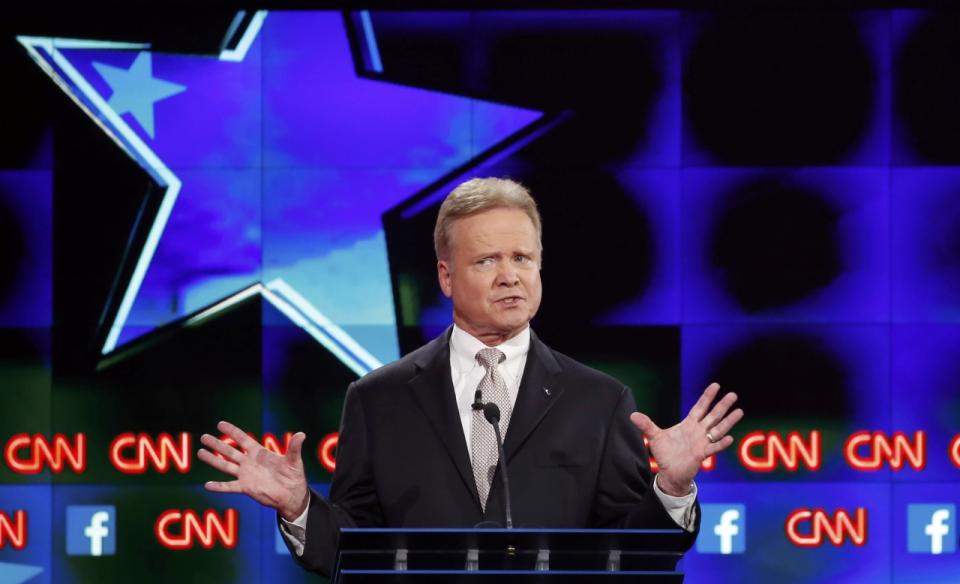Jim Webb drops out of Democratic primary race
Jim Webb speaks during the first official Democratic debate of the 2016 presidential campaign in Las Vegas on Oct. 13. (Photo: Lucy Nicholson/Reuters)
Former Virginia Sen. Jim Webb dropped out of the Democratic presidential primary race Tuesday afternoon.
Webb, a Vietnam veteran and former Navy secretary, withdrew any consideration of being the party’s nominee during a news conference at 1 p.m. ET in Washington, D.C., but said he has not ruled out an independent run.
“It was very difficult to fundraise inside the Democratic Party structure right now,” he said to reporters. “I have no doubt that if I ran as an independent we would have significant financial help from people who want me to run as something other than a Democrat.”
Fox News, which broke the story of Webb’s decision to withdraw his candidacy earlier in the day, reported that he has become disillusioned by how campaign financing has, in his view, pushed both major political parties to extreme positions.
During the Tuesday press conference, he said that the very nature of American democracy is under siege by how the current power structure finances both political parties.

“Our political candidates are being pulled to the extremes. They are increasingly out of step with the people they are supposed to serve,” he said.
Webb, 69, said that polls show a great number of Americans consider themselves independents rather than Republicans nor Democrats.
“I’ve said for years that the Democratic Party needs to get back to its more traditional message. I’m not seeing that in a way that I wish that I could see it,” he said.
Webb said he will keep talking to people who have been encouraging him to launch an independent campaign.
“We’ll just have to see what happens next,” he said.
During the Democratic primary debate on Oct. 13 in Las Vegas, he stood out as noticeably more moderate than his main competition for the party’s nod, former Secretary of State Hillary Clinton and Vermont Sen. Bernie Sanders.
Citing an op-ed in which Webb called affirmative action “state-sponsored racism,” CNN anchor and debate moderator Anderson Cooper asked Webb if he is out of step with where the Democratic Party is now.
SLIDESHOW: Jim Webb through the years >>>
His debate performance did not make a considerable impact on his poll numbers, and many liberal viewers ended the night feeling that he came across as simply too conservative to win the primary. He acknowledged this state of affairs Tuesday.
“I fully accept that my views on many issues are not compatible with the power structure and the nominating base of the Democratic Party,” he said.
Webb’s campaign had already revealed that he was considering an independent run on Monday. He said that this turn of events does not diminish his concerns for the challenges facing the U.S. or his belief that he would provide the best leadership.
In early July, when Webb announced his candidacy, he argued that fair debate is often drowned out by the huge sums of money funneled to candidates — both directly and indirectly.
“We need to shake the hold of these shadow elites on our political process,” he said at the time. “Our elected officials need to get back to the basics of good governance and to remember that their principal obligations are to protect our national interests abroad and to ensure a level playing field here at home, especially for those who otherwise have no voice in the corridors of power.”
This electoral ailment, to which Webb apparently hoped to be the antidote, appears to have been the death knell of his campaign.
He has had trouble raising enough money to pose a legitimate threat to either Clinton or Sanders. A recent filing, reported by Politico, revealed that Webb had raised only $696,972.18 and had $316,765.34 cash on hand. Contrast that with the $29,921,653.91 raised by Clinton or the $26,216,430.38 raised by Sanders.

